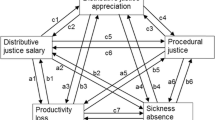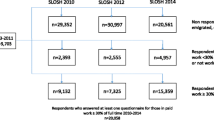Abstract
Purpose
The aim of the study was to identify associations between organizational injustice and work ability, disability days, and consultations with general practitioners.
Methods
Cross-sectional data of persons previously receiving sickness absence benefits were used for analyses. Organizational injustice was assessed using a German version of the “organizational justice questionnaire”. Dependent variables were the Work Ability Index, self-reported disability days, and consultations with general practitioners. Associations were adjusted for sociodemographic characteristics, behavioral health risks, neuroticism, effort–reward imbalance, and overcommitment.
Results
The analysis included 2983 employed persons (54.1% women, mean age: 47.9 years). High organizational injustice was associated with poor work ability (OR = 2.04, 95% CI 1.55–2.69). There were also slight associations with frequent self-reported disability days (OR = 1.34, 95% CI 1.06–1.68). The dependent variables were also associated with the effort–reward ratio and overcommitment.
Conclusion
Organizational injustice is associated with work ability, self-reported disability days, and health-care utilization. Results support the notion of a complementary role of the models of organizational justice and effort–reward imbalance.
Similar content being viewed by others
References
Arial M, Gonik V, Wild P, Danuser B (2010) Association of work related chronic stressors and psychiatric symptoms in a Swiss sample of police officers: a cross sectional questionnaire study. Int Arch Occup Environ Health 83:323–331
Bethge M, Spanier K, Neugebauer T, Mohnberg I, Radoschewski FM (2015) Self-reported poor work ability-an indicator of need for rehabilitation? A cross-sectional study of a sample of German employees. Am J Phys Med Rehabil 94:958–966
Bourbonnais R, Brisson C, Vinet A, Vezina M, Lower A (2006) Development and implementation of a participative intervention to improve the psychosocial work environment and mental health in an acute care hospital. Occup Environ Med 63:326–334
Bourbonnais R, Brisson C, Vezina M (2011) Long-term effects of an intervention on psychosocial work factors among healthcare professionals in a hospital setting. Occup Environ Med 68:479–486
Chenevert D, Jourdain G, Cole N, Banville B (2013) The role of organisational justice, burnout and commitment in the understanding of absenteeism in the Canadian healthcare sector. J Health Organ Manag 27:350–367
Dragano N, Wahrendorf M, Muller K, Lunau T (2016) Work and health inequalities: the unequal distribution of exposures at work in Germany and Europe. Bundesgesundheitsbla 59:217–227
Elovainio M, Kivimaki M, Vahtera J (2002) Organizational justice: evidence of a new psychosocial predictor of health. Am J Public Health 92:105–108
Elovainio M et al (2013) Perceived organizational justice as a predictor of long-term sickness absence due to diagnosed mental disorders: results from the prospective longitudinal Finnish Public Sector Study. Soc Sci Med 91:39–47
Hayashi T, Odagiri Y, Takamiya T, Ohya Y, Inoue S (2015) Organizational justice and insomnia: relationships between justice components and insomnia symptoms among private company workers in Japan. J Occup Health 57:142–150
Head J et al (2007) Effort-reward imbalance and relational injustice at work predict sickness absence: the Whitehall II study. J Psychosom Res 63:433–440
Hjarsbech PU et al (2014) A multi-wave study of organizational justice at work and long-term sickness absence among employees with depressive symptoms. Scand J Work Environ Health 40:176–185
Hoven H, Siegrist J (2013) Work characteristics, socioeconomic position and health: a systematic review of mediation and moderation effects in prospective studies. Occup Environ Med 70:663–669
Ilmarinen J (2009) Work ability—a comprehensive concept for occupational health research and prevention. Scand J Work Environ Health 35:1–5
Inoue A, Kawakami N, Eguchi H, Miyaki K, Tsutsumi A (2015) Organizational justice and physiological coronary heart disease risk factors in Japanese employees: a cross-sectional study. Int J Behav Med 22:775–785
Jaaskelainen A et al (2016) Work ability index and perceived work ability as predictors of disability pension: a prospective study among Finnish municipal employees. Scand J Work Environ Health 42:490–499. doi:10.5271/sjweh.3598
Juvani A et al (2016) Organizational justice and disability pension from all-causes, depression and musculoskeletal diseases: a Finnish cohort study of public sector employees. Scand J Work Environ Health 42:395–404
Kim IH, Muntaner C, Vahid Shahidi F, Vives A, Vanroelen C, Benach J (2012) Welfare states, flexible employment, and health: a critical review. Health Policy 104:99–127
Kivimaki M, Virtanen M, Elovainio M, Kouvonen A, Vaananen A, Vahtera J (2006) Work stress in the etiology of coronary heart disease—a meta-analysis. Scand J Work Environ Health 32:431–442
Kivimaki M, Vahtera J, Elovainio M, Virtanen M, Siegrist J (2007) Effort-reward imbalance, procedural injustice and relational injustice as psychosocial predictors of health: complementary or redundant models? Occup Environ Med 64:659–665
Klasen B, Hallner D, Schnaub C, Wilburger R, Hasenbring M (2004) Validation and reliability of the German version of the Chronic Pain Grade questionnaire in primary care back pain patients. Psychosoc Med 1:Doc07
Labriola M, Lund T (2007) Self-reported sickness absence as a risk marker of future disability pension. Prospective findings from the DWECS/DREAM study 1990–2004. Int J Med Sci 4:153–158
Lang FR, Lüdtke O, Schupp J, Wagner GG (2011) Short assessment of the Big Five: robust across survey methods except telephone interviewing. Behav Res Methods 43:548–567
Lanzieri G (2011) The greying of the baby boomers. A century-long view of ageing in European populations. Stat Focus 23:1–11
Linton SJ et al (2014) The effect of the work environment on future sleep disturbances: a systematic review. Sleep Med Rev 23C:10–19
Little R, Rubin D (2002) Statistical analysis with missing data. Wiley, Hoboken
Moorman RH (1991) Relationship between organizational justice and organizational citizen behaviour: does fairness perception influence employee citizenship? J Appl Psychol 76:845–855
Nakagawa Y et al (2015) Change in organizational justice and job performance in Japanese employees: a prospective cohort study. J Occup Health 57:388–393
Ndjaboué R, Brisson C, Vénzina M (2012) Organisational justice and mental health: a systematic review of prospective studies. Occup Environ Med 69:694–700
Niedhammer I, Tek ML, Starke D, Siegrist J (2004) Effort-reward imbalance model and self-reported health: cross-sectional and prospective findings from the GAZEL cohort. Soc Sci Med 58:1531–1541
Podsakoff PM, MacKenzie SB, Lee JY, Podsakoff NP (2003) Common method biases in behavioral research: a critical review of the literature and recommended remedies. J Appl Psychol 88:879–903
Rautio M, Michelsen T (2013) How to use the work ability index questionnaire. Tammerprint, Tampere
Royston P, White I (2011) Multiple imputation by chained equations (MICE): implementation in Stata. J Stat Softw 45:2–20
Rugulies R, Aust B, Madsen IEH (2016) Effort–reward imbalance and affective disorders. In: Siegrist J, Wahrendorf M (eds) Work stress and health in a globalized economy: the model of effort–reward imbalance. Springer International Publishing, Cham, pp 103–143
Siegrist J, Wege N, Puhlhofer F, Wahrendorf M (2009) A short generic measure of work stress in the era of globalization: effort-reward imbalance. Int Arch Occup Environ 82:1005–1013
Siegrist J et al (2014) Validating abbreviated measures of effort-reward imbalance at work in European cohort studies: the IPD-Work consortium. Int Arch Occup Environ 87:249–256
Spanier K, Radoschewski FM, Gutenbrunner C, Bethge M (2014) Direct and indirect effects of organizational justice on work ability. Occup Med (Lond) 64:638–643
Stansfeld SA, Bosma H, Hemingway H, Marmot MG (1998) Psychosocial work characteristics and social support as predictors of SF-36 health functioning: the Whitehall II study. Psychosom Med 60:247–255
Steptoe A, Siegrist J, Kirschbaum C, Marmot M (2004) Effort-reward imbalance, overcommitment, and measures of cortisol and blood pressure over the working day. Psychosom Med 66:323–329
von Bonsdorff ME et al (2014) Organizational justice, selection, optimization with compensation, and nurses’ work ability. J Occup Environ Med 56:326–330
Watson D, Pennebaker JW (1989) Health complaints, stress, and distress: exploring the central role of negative affectivity. Psychol Rev 96:234–254
Ybema JF, Van den Bos K (2010) Effects of organizational justice on depressive symptoms and sickness absence: a longitudinal perspective. Soc Sci Med 70:1609–1617
Ybema JF, van der Meer L, Leijten FR (2016) Longitudinal relationships between organizational justice, productivity loss, and sickness absence among older employees. Int J Behav Med 23:645–654. doi:10.1007/s12529-016-9546-y
Author information
Authors and Affiliations
Corresponding author
Ethics declarations
Conflict of interest
The authors declare that they have no conflicts of interest.
Rights and permissions
About this article
Cite this article
Spanier, K., Peters, E., Michel, E. et al. Associations between organizational injustice and work ability, self-reported disability days, and medical consultations: cross-sectional findings from employees with prior sickness absence payments. Int Arch Occup Environ Health 90, 789–797 (2017). https://doi.org/10.1007/s00420-017-1242-y
Received:
Accepted:
Published:
Issue Date:
DOI: https://doi.org/10.1007/s00420-017-1242-y




